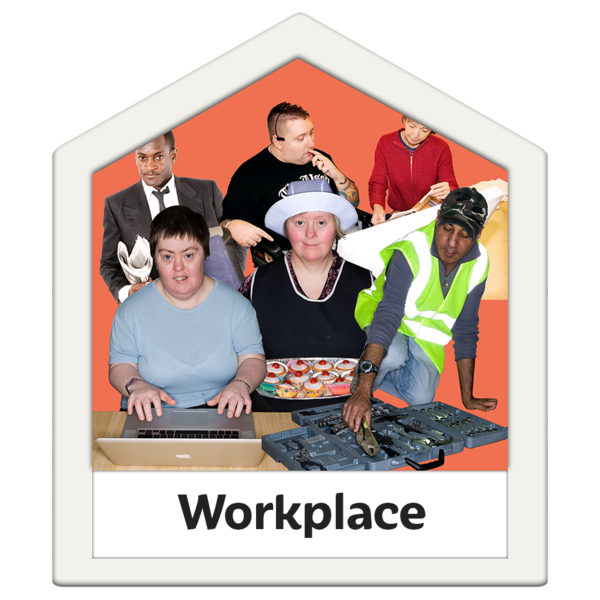Today Mencap and Inclusive Employers launch Learning Disability Work Experience Week working with companies including BBC, The Guardian, Wetherspoons and the NHS to offer work placements to people with a
learning disability
 A learning disability is to do with the way someone's brain works. It makes it harder for someone to learn, understand or do things.
.
A learning disability is to do with the way someone's brain works. It makes it harder for someone to learn, understand or do things.
.
New research released today by the charity Mencap reveals that just 52% of the public say they would prefer to work for a company that employs people with a learning disability.
An indication of the direct affect public attitudes has on learning disability
employment
 Employment means having a job.
levels; with just 5.8% of people with a learning disability known to local authorities currently in employment.
Employment means having a job.
levels; with just 5.8% of people with a learning disability known to local authorities currently in employment.
Following this research and
the government
 The Government are the people who run the country. The Government decide how much tax people should pay and how things like the National Health Service (NHS) should work.
’s recent failure in the DWP Green Paper to set any meaningful milestones in terms of meeting the government’s manifesto commitment to halve the disability employment gap, Mencap have announced the steps it feels the government needs to take to successfully achieve its manifesto commitment:
The Government are the people who run the country. The Government decide how much tax people should pay and how things like the National Health Service (NHS) should work.
’s recent failure in the DWP Green Paper to set any meaningful milestones in terms of meeting the government’s manifesto commitment to halve the disability employment gap, Mencap have announced the steps it feels the government needs to take to successfully achieve its manifesto commitment:
Mencap believes that to overcome the woefully low employment levels of people with a learning disability, the following needs to happen:
- improving access to apprenticeships
- growing the number of
supported internships
A work placement for young people with additional needs, where they get support from a job coach.
- improving support for employers wanting to take on staff with a learning disability.
- boosting the number of job coaches
- reform of the failed Work Capability
Assessment
 An assessment is a way of finding out what help a person needs. When you have an assessment, you might have to go to a meeting or fill in a form.
which continues to incorrectly assess people with a learning disability as being ‘fit-for-work’.
An assessment is a way of finding out what help a person needs. When you have an assessment, you might have to go to a meeting or fill in a form.
which continues to incorrectly assess people with a learning disability as being ‘fit-for-work’.
To better understand the publics attitudes towards employment of people with a learning disability; Mencap have produced a video which explores the publics gut reactions when asked about working with someone who has a learning disability; despite many revealing outdated stereotypical opinions on why it may be hard for a person with a learning disability to successfully secure a job; an overwhelming majority were supportive of employment for people with a learning disability, with many of those interviewed saying that they would like employers to do more to make their workplace
accessible
 Accessible means something is easy for people to use or join in with. For example: Accessible writing means the writing is easy to read and understand.
to people with a learning disability.
Accessible means something is easy for people to use or join in with. For example: Accessible writing means the writing is easy to read and understand.
to people with a learning disability.
The Mencap and Populus
survey
 A survey is when someone asks you to answer some questions.
results revealed:
A survey is when someone asks you to answer some questions.
results revealed:
- over half (52%) of the public would prefer to work for a company that employed people with a learning disability
- just 4% said they would prefer not to with the rest either unsure or not knowing
- 62% of the public said they have never worked with someone who has a learning disability.
Mencap has worked with hundreds of employers to make them aware of the many benefits that can come from employing people with a learning disability which include:
- stay in job posts longer
- take fewer sick days
- improve staff morale
- improve public perceptions of organisations
- reduce recruitment costs
- economic benefit of opening up new base of disabled customers.
The research and video coincide with today’s (7th November) launch of Mencap and Inclusive Employer’s Learning Disability
Work Experience
 Work experience is when you try out a job to help you learn new skills.
Week. Working with companies including The Guardian, Channel 4, McDonalds, the NHS, BBC, and Wetherspoon’s to provide work placements across the country for people with a learning disability.
Work experience is when you try out a job to help you learn new skills.
Week. Working with companies including The Guardian, Channel 4, McDonalds, the NHS, BBC, and Wetherspoon’s to provide work placements across the country for people with a learning disability.
Jan Tregelles, chief executive of Mencap, said:
This research and public reactions really highlights how a lack of understanding around what people with a learning disability are capable of is a crucial factor in the woefully low employment rates experienced by people with a learning disability.
It is however hugely encouraging that when made to think about the issue the public came out in overwhelming support towards employing people with a learning disability, but disheartening to see the outdated assumptions people still have around learning disability. It’s these assumptions which run through society that can make it so challenging for people with a disability to secure employment.
That’s why it’s important to open up a discussion around the fears and concerns that people have about working with somebody with a learning disability. By tackling this head on we can breakdown these barriers; which more often than not are far from reality. In fact, our experience with employers shows that employing a person with a learning disability has an overwhelming amount of benefits for a company; people with a learning disability tend to be more hardworking, take less sick days, boost overall employee morale and opens up a whole new market of disabled customers.
Employers we work with consistently tell us how with a little effort they’ve made their workplaces inclusive to people with a learning disability and encourage others to take the same steps. Whilst employers can play a big role, the Government must play its part by opening up apprenticeships to people with a learning disability, reforming the failed ‘fit-for-work test’, offering more support to employers and putting an end to a benefits system that can trap people with a learning disability in a cycle of poverty.
Richard McKenna, Director of Inclusive Employers, said:
Learning Disability Work Experience Week is not only a much needed opportunity for people with a learning disability to gain work place experience, but it also offers companies the chance to maximise business potential through inclusion.”
Many companies who have not much experience working with people with a learning disability may initially find the prospect slightly daunting, despite the many benefits that it can bring to their business. That’s why 4 years ago we started working with Mencap to create Learning Disability Work Experience Week. Each year the initiative has grown, and we continue to see participants being offered employment.
Vijay Patel has a learning disability and has applied unsuccessfully for over 50 full-time jobs. He is taking part in Learning Disability Work Experience Week:
I was not surprised when I saw the research into what the public think about employing people with a learning disability. I think that sometimes employers see my learning disability before they see me, and that makes it a lot harder for me to get a job- even though I have the skills to do it
I have been applying for jobs for a long time now. I work one day a week in a local pub, and also volunteer
A volunteer is someone who helps out by doing work for free. for Mencap, but I would really like to get a full time job in an office. I have a lot of office based skills, and I would like to work somewhere I can have opportunities.
I am really happy to have a work placement during Learning Disability Work Experience Week, it will be a great chance to get more experience. It’s good to have Mencap and Inclusive Employers supporting me with my job search; they believe in me, and I believe in me, so I know I can do it.
A survey Mencap ran last year of over 60 UK employers revealed some of the barriers people with a learning can experience looking for work:
- 23% of employers feel not all their colleagues would be happy working with somebody with a learning disability
- 79% agreed having disabled employees helps a company understand its disabled customers better
- almost half (45%) of representatives who have not employed somebody with a learning disability were concerned it might be more difficult for members of public to deal with members of staff with a learning disability. This drops to 30% who have employed staff with a learning disability
- almost half (46%) of representatives acknowledged that their organisation’s job descriptions, adverts and application forms are not easy for somebody with a learning disability to read and fill in.
-ENDS-
For further information or to arrange interviews, please contact the Mencap press office on 020 7696 5414 or media@mencap.org.uk or for out of hours 07770 656 659.
Notes to editors
Populus survey
An online survey was conducted with external company, Populus, using a UK sample of 2,095 online panellists aged 16 and over. Populus and Mencap worked together to develop the survey questionnaire.
The data was weighted to ensure a nationally representative sample of people aged 16 and over in the UK. When interpreting the survey findings, it is important to remember that the results are based on a sample of the population, not the entire population, and are therefore subject to confidence intervals.
Have you ever worked with someone who has a learning disability:
Yes: 27%
No: 62%
Don’t know: 10%
Never Worked: 1%
Would you prefer to work for an organisation that hired people with a learning disability:
Strongly agree: 31%
Slightly agree: 21%
Neither Agree or Disagree: 42%
Slightly disagree: 3%
Strongly disagree: 1%
Don’t know: 3%
Mencap employment survey
Mencap surveyed over 60 UK employers between September 3 2015 and October 15 2015. The survey was conducted across the country and results can be found below.
Which of these best describes the size of your organisation?
Response
Chart
Percentage
Count
Micro Business, 1 to 10 employees
13.1%
8
Small Business, 11 to 50 employees
19.7%
12
Medium Business, 51 to 250 employees
14.8%
9
Large business, over 250 employees
52.5%
32
Total Responses
61
Below are some statements that relate to employing someone with a learning disability. Please read the statements and indicate whether you agree or disagree with them.
Agree strongly
Agree slightly
Neither agree nor disagree
Disagree slightly
Disagree strongly
Total Responses
Our job descriptions, adverts and application forms are easy for someone with learning disability to read and fill in
5 (8.2%)
9 (14.8%)
19 (31.1%)
18 (29.5%)
10 (16.4%)
61
Having disabled employees helps a company understand its disabled customers or clients.
31 (50.8%)
17 (27.9%)
10 (16.4%)
2 (3.3%)
1 (1.6%)
61
Everyone in my organisation would be happy working alongside someone with a learning disability
13 (21.3%)
18 (29.5%)
16 (26.2%)
12 (19.7%)
2 (3.3%)
61
I worry that there is extra work involved in recruiting and managing someone with a learning disability
8 (13.1%)
20 (32.8%)
10 (16.4%)
11 (18.0%)
12 (19.7%)
61
People with a learning disability are able to work in my workforce
29 (47.5%)
15 (24.6%)
10 (16.4%)
6 (9.8%)
1 (1.6%)
61
It might be difficult for members of the public to deal with staff who have a learning disability
3 (4.9%)
22 (36.1%)
15 (24.6%)
15 (24.6%)
6 (9.8%)
61
About Mencap
There are 1.4 million people with a learning disability in the UK. Mencap works to support people with a learning disability, their families and carers by fighting to change laws, improve services and access to
education
 Education is when you learn things. When you fill in a form to get a job, education means you write where you went to school, college or university.
, employment and
leisure
Education is when you learn things. When you fill in a form to get a job, education means you write where you went to school, college or university.
, employment and
leisure
 Leisure is when you have time to do things you enjoy like playing sports or going to the pub.
facilities. Mencap supports thousands of people with a learning disability to live their lives the way they want.
Leisure is when you have time to do things you enjoy like playing sports or going to the pub.
facilities. Mencap supports thousands of people with a learning disability to live their lives the way they want.
For advice and information about learning disability and Mencap services in your area, contact Mencap Direct on 0808 808 1111 (9am-5pm, Monday-Friday) or email help@mencap.org.uk
What is a learning disability?
A learning disability is a reduced intellectual ability which can cause problems with everyday tasks – for example shopping and cooking, or travelling to new places – which affects someone for their whole life.
People with a learning disability can take longer to learn new things and may need support to develop new skills, understand difficult information and engage with other people. The level of support someone needs is different with every individual. For example, someone with a severe learning disability might need much more support with daily tasks than someone with a mild learning disability.
Learning disability is not a mental illness or a learning difficulty. Very often the term ‘learning difficulty’ is wrongly used interchangeably with ‘learning disability’.